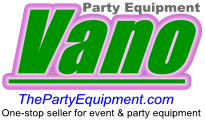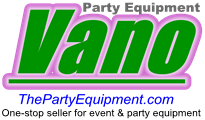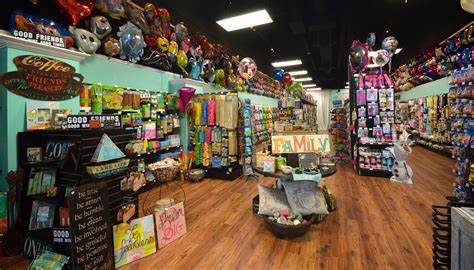PLAN ON A PARTY SUPPLY STORE
Party supply stores offer supply rentals, costumes, party favors, seasonal items, balloons, decorations and disposable silverware items. They’re a one-stop-shop for anything seasonal, often revamping entire product lines to take care of seasonal crowds. They’re often prioritized providers on Halloween, Christmas and birthdays due to their niche products and services. Learn how to start your own Party Supply Store and whether it is the right fit for you.
Start a party supply store by following these 9 steps:
You have found the perfect business idea, and now you are ready to take the next step. There is more to starting a business than just registering it with the state. We have put together this simple guide to starting your party supply store. These steps will ensure that your new business is well planned out, registered properly and legally compliant.
STEP 1: Plan your Business
A clear plan is essential for success as an entrepreneur. It will help you map out the specifics of your business and discover some unknowns. A few important topics to consider are:
What are the startup and ongoing costs?
Who is your target market?
How much can you charge customers?
What will you name your business?
Luckily we have done a lot of this research for you.
What are the costs involved in opening a party supply store?
A party supply store’s initial investment is about $90,300. This accounts for all certifications, insurance and products. A starting party supply store needs to obtain a number of products, including paper products, decorations, banners and tablecloths. It will also need a full line of wedding accessories, such as cake tops, server sets and similar items. Halloween costumes, candy and entertainment supplies will need to be purchased. In some cases, an additional $10,000 in startup expenses will exist, channeled into etching and engraving machinery.
What are the ongoing expenses for a party supply store?
As a rule of thumb: For every $1 spent on labor, operators can expect to spend $0.30 on capital investment. These investments are minimal, and yearly expenses can be as low as $15,000. These expenses account for utility costs, annual rent, product sourcing and advertising. Assuming the party supply store is of average size, and in a profitable shopping location, a rent expense of about $3,000 per month is acceptable.
Who is the target market?
A party supply shop’s best customers will be seasonal “holiday shoppers.” Holiday shoppers may shop exclusively at a party supply store during Christmas, Halloween and the Fourth of July. That said, holiday shoppers can often be rushed. For this reason, an ideal shopper will be one who doesn’t exploit holiday product return policies. Because holiday-purchased items aren’t useful during non-holiday hours, product purchase exploitation frequently happens.
How does a party supply store make money?
While a party supply store can make money year-round, much of its revenue will be gained during the holidays—specifically Halloween. A store makes money by selling costumes, party favors, candy, balloons, costume makeup and decorations. Several party supply stores offer bounce house, fogger and professional party display rentals, too. If a party store offers such big-cot rentals, they frequently limit their availability. Again, a party supply store’s ability to maximize sales greatly depends on its customers’ holiday and party needs. Often, a party supply store is a local area’s only provider of costumes and specialty holiday products. It simply isn’t profitable for department stores to carry such items, year-round.
How much can you charge customers?
Basic party supplies should cost between $4 and $15, depending on their use. High-demand, disposable items like paper cups, plates and banners will be slightly less expensive. Costumes, meanwhile, will need to be priced competitively while also making money. Average costumes should be priced between $40 and $80, depending on their complexity. Low-quality costumes—and child costumes—can be sold for about $20. Candy, balloons and other small, bulk-purchase items can be sold for under $5.
How much profit can a party supply store make?
A party supply store can make a little over $100,000, if it’s operating efficiently. Once expenses, investments and advertisement are paid, a party supply store manager can make approximately $57,000 per year. Assistant managers can expect to make approximately $33,000 per year.
How can you make your business more profitable?
Attract local support. Once your business has grown, vary its services to suit monetary needs. A party supply store capable of offering the area’s only bounce houses, professional displays and specialty costumes will thrive. Effective cost control, too, will help a costume supply store thrive.
What will you name your business?
Choosing the right name is very important. If you don’t have a name in mind already, read our detailed guide on how to name a business or get some help brainstorming a name with our Party Supply Store Business Name Generator.
Then, when registering a business name we recommend checking if the business name is available in your state, federally by doing a trademark search, searching the web, and making sure the name you choose is available as a web domain to secure it early so no one else can take it.
Find a Domain Now
Search for your perfect domain…
.com
Powered by GoDaddy.com
After registering a domain name, consider setting up a professional email account (@yourcompany.com). Google’s G Suite offers a business email service that comes with other useful tools, including word processing, spreadsheets, and more. Try it for free
STEP 2: Form a legal entity
Establishing a legal business entity such as an LLC prevents you from being personally liable if your party supply store is sued. There are many business structures to choose from including: Corporations, LLC’s, and DBA’s.
FORM YOUR LLC
Read our Guide to Form Your Own LLC
Select Your State
Have a Professional Service Form your LLC for You
TWO SUCH RELIABLE SERVICES:
Four point Seven out of Five Stars ZenBusiness ($39 + State Fees)
Three point four out of Five Stars LegalZoom ($79 + State Fees)
Check out the Top Business Formation Services from our friends at StartupSavant.
You should also consider using a registered agent service to help protect your privacy and stay compliant.
STEP 3: Register for taxes
You will need to register for a variety of state and federal taxes before you can open for business.
In order to register for taxes you will need to apply for an EIN. It’s really easy and free!
A cube with LLC printed on its sides
You can acquire your EIN for free through the IRS website, via fax, or by mail. If you would like to learn more about EINs and how they can benefit your LLC, read our article, What is an EIN?.
STEP 4: Open a business bank account & credit card
Using dedicated business banking and credit accounts is essential for personal asset protection.
When your personal and business accounts are mixed, your personal assets (your home, car, and other valuables) are at risk in the event your business is sued. In business law, this is referred to as piercing your corporate veil.
Additionally, learning how to build business credit can help you get credit cards and other financing in your business’s name (instead of yours), better interest rates, higher lines of credit, and more.
Open a business bank account
This separates your personal assets from your company’s assets, which is necessary for personal asset protection.
It also makes accounting and tax filing easier.
A cube with LLC printed on its sides
Recommended: You can get $300 when you open a Chase Total Business Checking? account with qualifying activities. Learn More.
Get a business credit card
This helps you separate personal and business expenses by putting your business’ expenses all in one place.
It also builds your company’s credit history, which can be useful to raise money and investment later on.
Recommended: Read our guide to find the best small business credit cards.
STEP 5: Set up business accounting
Recording your various expenses and sources of income is critical to understanding the financial performance of your business. Keeping accurate and detailed accounts also greatly simplifies your annual tax filing.
STEP 6: Obtain necessary permits and licenses
Failure to acquire necessary permits and licenses can result in hefty fines, or even cause your business to be shut down.
State & Local Business Licensing Requirements
Certain state permits and licenses may be needed to operate a party supply store. Learn more about licensing requirements in your state by visiting SBA’s reference to state licenses and permits.
Most businesses are required to collect sales tax on the goods or services they provide. To learn more about how sales tax will affect your business, read our article, Sales Tax for Small Businesses.
Certificate of Occupancy
A party supply store is usually run out of a storefront. Businesses operating out of a physical location typically require a Certificate of Occupancy (CO). A CO confirms that all building codes, zoning laws and government regulations have been met.
If you plan to lease a storefront:
It is generally the landlord’s responsibility to obtain a CO.
Before leasing, confirm that your landlord has or can obtain a valid CO that is applicable to a party supply store.
After a major renovation, a new CO often needs to be issued. If your place of business will be renovated before opening, it is recommended to include language in your lease agreement stating that lease payments will not commence until a valid CO is issued.
If you plan to purchase or storefront:
You will be responsible for obtaining a valid CO from a local government authority.
Review all building codes and zoning requirements for you business’ location to ensure your party supply store will be in compliance and able to obtain a CO.
STEP 7: Get Business Insurance
Just as with licenses and permits, your business needs insurance in order to operate safely and lawfully. Business Insurance protects your company’s financial wellbeing in the event of a covered loss.
There are several types of insurance policies created for different types of businesses with different risks. If you’re unsure of the types of risks that your business may face, begin with General Liability Insurance. This is the most common coverage that small businesses need, so it’s a great place to start for your business.
Learn more about General Liability Insurance.
Another notable insurance policy that many businesses need is Workers’ Compensation Insurance. If your business will have employees, it’s a good chance that your state will require you to carry Workers’ Compensation Coverage.
Recommended: Learn what business insurance for your Party Supply Store will cost.
STEP 8: Define your brand
Your brand is what your company stands for, as well as how your business is perceived by the public. A strong brand will help your business stand out from competitors.
How to promote & market a party supply store
Promote before, during, and after the holidays. Printed ads and local Facebook advertisements are your friend. Your marketing plan should focus on bulk items and unique party displays. Don’t worry about luxury rental product marketing—like bounce houses and Hollywood-level costumes. These items will promote themselves. Holiday shoppers want quick, accessible and cheap items. Over Halloween, they’re looking for unique costumes, affordable makeup and cheap, disposable gag items
How to keep customers coming back
To attract customers, focus on pre-holiday events. Partner with local shops who’re hosting monthly events and parties. Use printed ads. Promote on Facebook, Twitter, and Instagram. To retain customers, create a return policy which both makes the business profitable while giving customers the freedom to exchange and return products at need. High-quality party supply stores are reliable, have unique options and—above all—have great prices. Because the party supply business hungers for sales, prices are usually sky-high. By offering low prices, you’ll keep year-round customers.
STEP 9: Establish your Web Presence
A business website allows customers to learn more about your company and the products or services you offer. You can also use social media to attract new clients or customers.
Start A Party Supply Store In Your State
A cube with LLC printed on its sides
Select your state below for an in-depth guide on completing each of these steps in your home state.
Select Your State
Is this Business Right For You?
A party supply store is often a small business. While large party store chains exist, any who own or manage a local party store will need to enjoy small business operations. Perfect for party-lovers, retail gurus and fun-loving store owners, a party supply store is an excellent business for those interested in advertising, professional selling, and merchandising.
What happens during a typical day at a party supply store?
A party supply store needs to be a preferred location during the holidays, due to its niche product stock. For this reason, day-to-day activities during holiday hours are drastically different than during non-holiday hours.
Over the holidays, a holiday supply store owner must handle rush orders, filing go-back items, handling costume fittings, managing increased product shipments, creating a custom return policy, and prioritizing customer service. During non-holiday hours, an owner must be able to conduct the regular responsibilities associated with any small business owner. In-house finances, marketing, management, promotion, and shop upkeep are important.
While owners shouldn’t focus on product upkeep too much, several items in part stores—due to their disposable nature—may need to be replaced over time. Party supply stores often face slow periods when holidays aren’t near. These time periods deserve extra attention, so as to keep the shop operational.
What are some skills and experiences that will help you build a successful party supply store?
Above all, a strong sense of finance and marketing is needed. Because party supply stores face considerable difficulties with year-round financing, a strong grasp on local economics, product sourcing, and promotion is needed. A successful party supply store owner is often well-read in local customer needs, too.
A knack for customer service is also important. During holiday hours, a party supply store can become hectic. All staff should be capable of handling tough customer decisions. Professional selling, a background in retail—specifically clothing—and knowledge of current trends certainly helps. Because Halloween is a notoriously party-store-centric holiday, having knowledge about current costume favorites is a must.
What is the growth potential for a party supply store?
Party supply stores do have difficulty growing. Because they’re in a niche product and service category, they often have financial growth and scaling difficulties during non-holiday hours. For this reason, larger chains like Party Land and Party City dominate the market. A party supply store can, however, become a local area’s preferred location rather easily. Party supply store franchises certainly exist, but they’re difficult to obtain.


